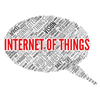How Home Automation is Changing the Way We Live

"Any sufficiently advanced technology is indistinguishable from magic." - Arthur C. Clarke
We are living in the era where controlling almost anything with our mobile devices is becoming a possibility. Clarke's observation continues to strike us as truer and truer.
Home automation refers to the tasks inside a home that can be set up to function automatically and may be controlled remotely.
The big idea, as always, is to make lives simpler, easier and more efficient.
Home automation has evolved considerably over the past few decades. It may be hard to believe now, but everyday appliances such as washing machines, dishwashers, refrigerators and water heaters were considered a part of home automation once. They automated certain tasks inside the home and saved us considerable time and energy.
That was in the 1900s. Since then, we have come a long way. In fact, over the final decades of the last century, and the recent ones of this century, technology has leapfrogged.
It has shed its utilitarian garb and has taken on an almost mystical aura.
Sophisticated computers, smartphones, mobile-controlled security systems, drone cameras - we have an ever growing litany of impressive devices taking us through our days.
It has become a big business now, as tech-lovers embrace these inventions. The Internet of Things has brought enhanced functionality and added a world of greater possibilities to the mix. By 2012, 1.5 million home automation systems were installed in the United States. Globally, this market is expected to be worth as much as $21.6 billion by 2020.
Apple (HomeKit - pictured below), Google (Nest), Samsung (SmartThings), Belkin, IControl Networks, Wink, Logitech and Honeywell are some of the biggest names in this industry.
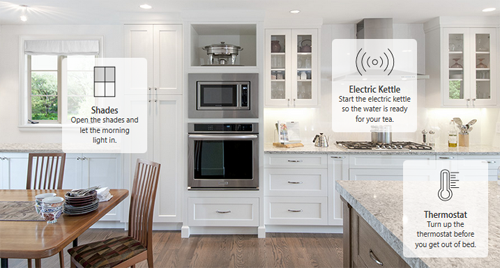
Let's look at some of the cool tech that is changing our lives.
Let there be (smart) light, said the Voice
Lights that come on when you step into a room are old news, but lights that you can control in the entire house, including the back and front yards, from the resort you're vacationing in, that is something new. It's not just cool, it's convenient as well.
For safety concerns people are often asked to leave the front lights on when they are away (to ward off potential burglars). With the Philips Hue lighting system, you get to control the lighting in your house in a number of ways. You can change the hues of the light (hence the name) depending on your mood or requirement, adjust the brightness, and carry out a number of other functions. These wireless LED bulbs can be controlled remotely with Hue's iOS app.
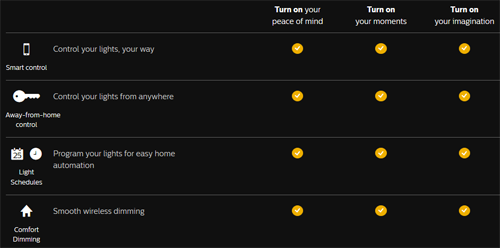
Philips is not the only company making smart lights. LIFX, Avea, Belkin, Samsung, and many more are doing it, too.
These gadgets even work together to bring you greater control over home automation. Philips Hue Lighting, Amazon Echo Voice (the hands-free smart speakers that listen to your commands), and Nest's smart thermostats are a case in point. If you talk to the Echo, the Hue bulbs will know you are in the room and will keep the lights on and the thermostat will adjust the temperature of the room accordingly.
If this then a whole lot of automation
If-This-Then-That (IFTTT) is not a tool but a platform that helps you create recipes to simplify your life. That in itself is pretty awesome, but combined with automated home systems, this takes things to a new level.
Some examples:
With a little bit of IFTTT creativity, you can use the fitness tracking wristband Jawbone Up24 for things other than tracking the number of miles you walked or the number of hours you've been inactive. Here's a suggestion: "Sync the thing up with IFTTT and you could have it automatically turn the lights on as you wake up, or log your sleep habits in a program like Evernote."
You can do some pretty cool things with the IFTTT Weather Channel, like turn on the coffee maker at sunrise or adjust the temperature indoors depending on the drop or rise in the temperature outdoors. You can also tweak the Nest Learning Thermostat by introducing customized triggers.
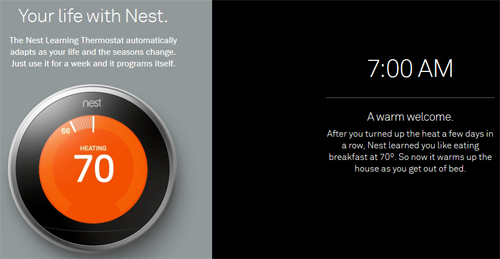
Browse the Internet to find out what magic you can create with IFTTT. There are many recipes ready to download if you are new to this.
Smart beds, locks and wine bottles
Smart wireless cameras have been around for a while, but locks and beds too have joined the Internet of Things bandwagon.
In combination with smart security systems, smart locks go a step further in assuring the safety of your home while you're away. Many of them are on the expensive side but offer rich features and are easy to install. Some of them even work with your existing deadbolts and keysets. Features differ from model to model but in general they offer a number of customizable codes, safety alarms that go off when someone is trying to pick the locks and can be used in sync with authorized devices (wireless).
Access to unauthorized persons can be sent over email or SMS, making available a virtual key to unlock the door.
Smart beds track the overall quality of your sleep by noting your breathing, heart rate, and movement. One of the smart beds (shown below) even adjusts through the night to give you better sleep.
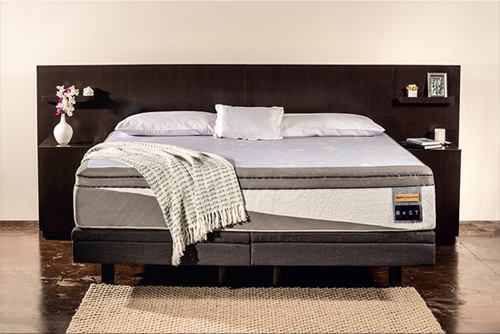
Smart wine bottles have got to be the wackiest of tech on the list. Why would you even need live notifications on your wine bottle of all things?
Well, apparently many think they do. Maker Kuvee has raised $6 million in funding to bring wine connoisseurs and tech-lovers (though many happen to be both) wine bottles with built-in touchscreens that display the history of the wine. Not only that, they will also suggest serving tips, food pairings, recommendations and allow you to reorder from the touchscreen.
The caveat?
With all these wondrous and impressive sounding-inventions, there's got to be a downside, right?
There is. A huge one. Smart tech in general is still growing and is far from perfect. The major downside of all of the above is that none of them will work without Wi-Fi. Also, you'd have a big problem to deal with if these gadgets don't "talk" to each other or talk to the wrong people with malicious intent.
A few of these innovations may seem beside the point to some but technology is all about pushing the boundaries of what is possible. Which of the newer smart tech seems the most impressive and useful to you? Leave a comment and let us know.
Subscribe to Our Newsletter!
Latest in Marketing







